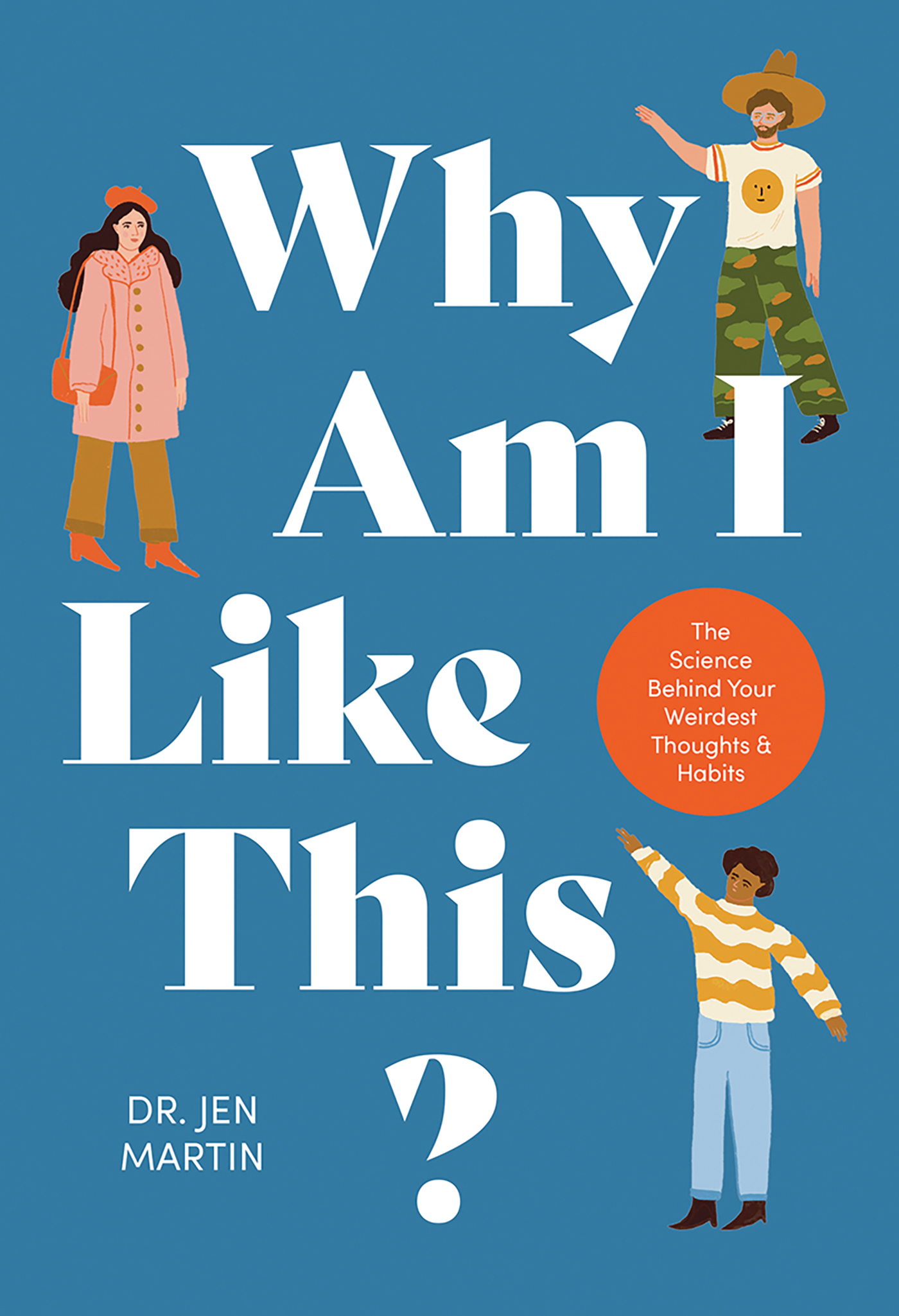Why can’t I stop taking photos? Why do I always feel like I’m missing out? Why can’t I remember why I walked into this room? In DR JEN MARTIN’s book, Why Am I Like This?, she delves into the science behind our strangest thoughts and habits, from why smells make us homesick to why we stick our tongues out when we’re concentrating.
Good Reading caught up with Dr Jen to ask her passion for science and the strangest questions she gets asked.
Were you interested in science as a child? Was there an event that drew you into the field?
I was fortunate to spend a lot of time in nature as a child, which is definitely where my passion for science began. I have many happy childhood memories of being outdoors: camping in the forest, snorkelling and rockpool rambling at the beach and helping my Dad look for frogs in local swamps and creek lands. My Dad is also a scientist and while his research focused on frogs, he also wrote and taught widely on evolutionary biology, animal behaviour, pollution, conservation and many other topics, so science was a part of our day-to-day lives.
Although not a professional scientist, my Mum is also an incredible scientific thinker and nature lover, and she encouraged me to pursue science around our home. She even helped me to conduct an experiment with our backyard chickens to see how the colour of their egg yolks changed according to what we fed them.

During my undergraduate science degree, I studied zoology, ecology, marine biology, wildlife conservation, evolution and animal behaviour. There’s no question I was drawn to these areas because of my love of nature. My PhD is in the field of behavioural ecology, which is essentially how the behaviour of animals influences their ability to survive and reproduce. As a researcher, I’ve been incredibly fortunate to work with a variety of native mammals in many beautiful parts of Australia and for many years I thought my future would involve wildlife conservation work.
But as I reached the end of my PhD, I began thinking a lot more about the role of science in society and how scientists could make a positive difference in the world. As a young scientist, you learn that to have a successful career you need to build a track record of communicating your research findings to other scientists, particularly in academic papers. That’s important, but I had also grown up believing that science is relevant to everyone and that everyone should be able to access accurate and easy to understand scientific information.
For my own research to be useful in the real world, I needed to share it with many people who had never studied science. But during all my years of education, I’d never learned how to do that and still today, few science students receive communications training.
As a result of those experiences, my work over the last 15 years has focused on science communication. I founded and lead a teaching program at the University of Melbourne that teaches scientists and science students from all disciplines how to write and speak about their work in ways that are clear and engaging for a variety of different audiences, including non-scientists. I also co-host a podcast, Let’s Talk SciComm, that ensures science communication training is freely accessible to anyone who is interested in developing their skills in this area. Both my teaching and my own work as a science communicator means these days I read, think, write and speak about an enormous variety of scientific topics which I love.
What is the most regular science question you get asked?
One of the best things about my work is that I get asked thousands of different questions – it’s rare for two of them to ever be the same! Most of us are inherently fascinated by how people think and behave, as well as the world around us, so there’s no end to the fabulous questions people ask. At the moment I’m being asked a lot of questions about Antarctica, particularly about penguins, because I’ve had the amazing privilege of spending time there recently in my role as a volunteer faculty member for Homeward Bound, a global leadership initiative for women and non-binary people with a background in STEMM (science, technology, engineering, maths and medicine).
What inspired you to write this book?
Why Am I Like This? began as a series of radio segments on the 3RRR FM Breakfasters show: I’ve had the great joy of talking about science on radio for nearly 20 years. Every week I pick a science question or topic I think people will find interesting, read up on what current research tells us about it, and then head into the studio to share it with the breakfast radio hosts.
This routine means I’m always on the lookout for interesting topics to explore and I spend a lot of time reading, speaking and writing about them. I love it! There are always more fascinating ideas and facts than I can fit into the short segments you’ll hear on the radio or the bite-sized entries you’ll read in the book, but crafting these stories is a lot of fun. And I hope both my radio broadcasting and writing will help more people to develop an interest in science and to realise that science is everywhere around us.
What are a few of the strangest facts you found out while researching this book?
Every time I pick a new topic to explore, I learn fascinating and often strange things. For example, did you know that it’s not that hard to implant a false memory in someone’s brain? Or that there are good reasons why it feels like time passes more quickly as you age? If you’re someone who blushes easily, you may be pleased to know that we trust and forgive people who blush more than those who don’t. Perhaps you’d like to understand why you take so many photos on your phone. Or why you sometimes walk into a room but then have no recollection of why you went there. To know the science behind these questions and more, you’ll need to read the book!
Did you discover something that surprised you?
I’m constantly discovering things that surprise me – every time I research a new topic! A couple of things that really stick in my mind are the fact that we spend 10 per cent of the time we’re awake with our eyes closed (because we blink every few seconds), but our brains manage to make the world around us seem continuous. I was also surprised to learn how powerful doodling is as a way of improving listening, thinking, concentration and focus.
It’s a shame that we tend to judge someone who is doodling during a class or meeting as being distracted because chances are, they’re listening very carefully and doing an excellent job of processing what’s going on around them.
What drives your passion for science? What’s the most exciting thing for you about your work?
My passion for science is driven by my constant curiosity – I want to understand the world around me and to know how I can make a positive contribution to it. I have the astonishing privilege of being alive at a time, and living in a country, where I have access to many wonderful things like education, healthcare, good food, technology, and transport.
But I also have the great responsibility of living at a time when our planet is in real trouble: the climate and biodiversity crises are happening right now. We’ll find many of the solutions we need in science, and I believe effective science communication will continue to play a crucial role in creating a more sustainable future. So there are many exciting parts of my work, first and foremost having the opportunity to work with enormously skilled and passionate scientists as they develop their communication skills. I also feel incredibly fortunate that my work involves reading, thinking, speaking and writing about science in all its glorious diversity. I hope anyone who comes into contact with me discovers that science is everywhere and also discovers – or rediscovers – their curiosity.
ABOUT THE AUTHOR






